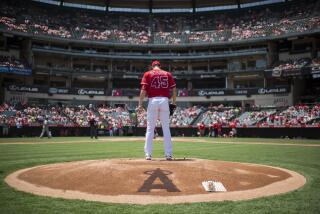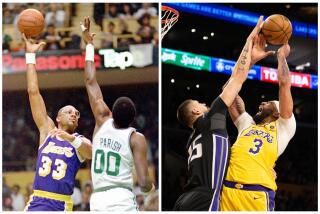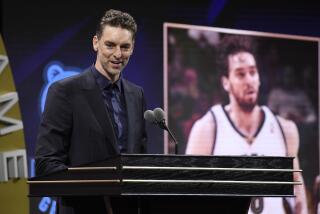Pau Gasol’s work with Children’s Hospital affects patients in different ways
Pau Gasol leaned over. He gripped a picture frame with both of his hands. Then he just stared.
In front of him stood a photo of the Lakers forward witnessing one of the three spinal surgeries he watched at Children’s Hospital Los Angeles in the last two years. Along the margins of the picture were words written in cursive and calligraphy, all with the same simple message and followed by heart signs: “Thank you.”
This is what Gasol meant when he stood moments earlier saying that his extensive work with the hospital “completes me as a human being.”
It’s not so much the gratification Gasol felt as he received the inaugural Kia Community Assist Award. It’s the realization that his platform and tapping into his passion as a former medical student could have a lasting affect on others.
“It might not make a huge difference and it might not save a kid’s life,” Gasol said. “It might. Who knows? But the energy and life you can inject to their kids and families is hard to measure because you don’t really know. But it’s a plus. I like to believe it makes a difference. If I can just get a smile out of them during that time, to me it’s powerful and worth it.”
Gasol’s understands the difficulty in truly assessing what he means for various patients because their circumstances are different.
Isabelle Shatuck, who Gasol saw receive spinal surgery two years ago, downplayed the easy story line that his presence in the operating room provided a psychological boost. “Honestly, I really don’t care if someone watches my surgery,” said Shattuck, who’s currently a sophomore at Scottsdale High. “It’s not really going to make a big impact on me.”
Meanwhile, 15-year-old Joshua Sandoval handled things differently last Tuesday when Gasol watched his spinal surgery. As soon as Sandoval woke up from surgery, his mother, Aracely Gomez, recalled her son saying, “Where’s my basketball?” It startled her. Sandoval didn’t bring a basketball to the hospital. But he had a Lakers backpack, which Gasol signed shortly before leaving Sandoval’s surgery. Gomez believed that Sandoval had been thinking about Gasol during his surgery and that his presence gave him enough strength to go under the knife.
“He was very eager to see him,” Gomez said. “I think it gave him more courage to go through this operation.”
The cold, hard data regarding Gasol’s involvement likely makes a bigger difference than anecdotal stories. After all, Gasol has visited the hospital more than 10 times, according to a spokesperson. He served as the hospital’s ambassador during an NBA Cares event leading into the 2011 NBA All-Star game in Los Angeles. Gasol has donated around $250,000 to the hospital, including a $25,000 check he presented Monday after receiving his award. Earlier this year, Gasol formed a partnership between the hospital and Grifols, a Barcelona-based global healthcare company, that donated equipment to the hospital. Gasol says he is also planning to talk with health officials in Spain this summer to discuss a possible fellowship that would entail the hospital training Spanish doctors.
But what remains more vivid involves Gasol’s hands-on involvement with the hospital. It’s one thing to donate money. It’s pretty easy for him to do that, considering Gasol’s slated to make $38.3 million in the next two years. It’s another thing to continually provide a physical presence.
That surely affected the outlook of various patients.
Shattuck may have expressed apathy about Gasol seeing her surgery. But she sounded excited about the bond it forged. During the Lakers’ 2010-11 season, Gasol invited Shattuck and her family to a game. There, Shattuck eagerly passed balls to Gasol during warmups and updated him about her progress toward finally having correct posture. After not even knowing of his existence before the surgery, Shattuck proudly owns a Gasol jersey.
Sandoval hadn’t met Gasol before his surgery, but he still kept an attachment to him. Gomez said Sandoval intently watches Laker games and considers Gasol his favorite player. When a Times reporter tried talking with Sandoval on the phone, he cried because he initially thought he was talking to Gasol.
“The kids aren’t thinking, ‘I had surgery, it hurts,’ ” said chief orthopedic surgeron Dr. David Skaggs. “They’re thinking, ‘I met Pau Gasol and I have his autograph.’ It’s the same for the families.”
It’s the same for Skaggs,too.
He described Gasol during his award presentation as “one of my true good friends.” They demonstrated that last week once they stepped out in the hallway following surgery. They appeared to be longtime college buddies.
“That was funny when you came in,” Skaggs said, laughing. “You almost put your arm around me.”
Gasol couldn’t help it. The two instantly bonded over their medical interests. Skaggs also related to Gasol’s athletic background. When he attended Amherst College, Skaggs said he played soccer and earned All-American honors in the 400-meter hurdles. When he went to medical school at the Columbia University College of Physicians and Surgeons, Skaggs joined the club rugby team. Gasol has frequented his house. There, Skaggs says his dog greets him by rolling over and his son asks to play pickup basketball.
As the two walked through a dizzying labyrinth of hallways and staircases at the hospital, they endlessly chatted. Skaggs directed him toward an office that featured posters of both Gasol and Kobe Bryant. Gasol willingly signed his name on his right arm, joking, “I never had a tattoo.” Skaggs then led him into his office to hand him two sets of his size-17 Nike shoes he would later give to two patients. As they walked back toward the patients’ wing, they talked about getting together for lunch.
Before that happened, though, Gasol still had more patients to see. After he gave his shoe to 12-year-old Yasmin Umanzor, she simply clutched it in her hands. She has lived with an intestinal issue since birth. The gesture from Gasol seemed to lift her spirits.
“Thank you,” Umanzor said with a smile.
Gasol nodded and said, “You’re welcome.” Then they talked about her progress. He saw firsthand the direct influence he had as she continued to smile and, at least momentarily, forget about her pain.
“When I see them doing well, healthy and smiling after surgery and recovered,” Gasol said, “it’s an incredible feeling of being happy and being pleased.”
RELATED:
Pau Gasol says charitable efforts give him broader perspective
Pau Gasol goes to the operating room -- as an observer
Pau Gasol to receive Kia Community Assist Award
Email the Lakers blog at mgmedin@gmail.com. Follow the Lakers blog on Twitter.
More to Read
All things Lakers, all the time.
Get all the Lakers news you need in Dan Woike's weekly newsletter.
You may occasionally receive promotional content from the Los Angeles Times.






